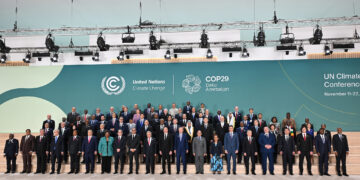The COP28 Presidency, in collaboration with the World Health Organization (WHO), has unveiled a pioneering initiative – the ‘COP28 UAE Declaration on Climate and Health.’ This declaration, backed by 123 countries, signals a pivotal moment in global recognition of the urgent need to fortify healthcare systems against the escalating impacts of climate change on public health.
The announcement, made during the World Climate Action Summit and coinciding with the first-ever Health Day at a COP, addresses the critical intersection of climate change and human health. Notably, this marks the first time governments worldwide have collectively acknowledged the imperative to safeguard healthcare systems against climate-related health threats, including extreme heat, air pollution, and infectious diseases.
COP28 President, Dr. Sultan Al Jaber, underscored the declaration’s significance in confronting the pressing challenges posed by climate change to human health. Dr. Al Jaber emphasized, “The impacts of climate change are already at our door. They have become one of the greatest threats to human health in the 21st century.”
WHO Director-General, Dr. Tedros Adhanom Ghebreyesus, expressed gratitude to the UAE for prioritizing health during its COP28 Presidency. He highlighted the declaration’s emphasis on building climate-resilient and low-carbon health systems to protect both planetary and human health.
President Lazarus Chakwera of Malawi, an early endorser of the Declaration, spoke passionately about the impacts of climate change on communities, calling for a path forward that prioritizes health investments, a just transition away from fossil fuels, and a healthier future.
The Declaration outlines key action areas, including building resilient health systems, fostering cross-sectoral collaboration, and increasing finance for climate and health solutions. Signatories commit to integrating health targets into national climate plans and enhancing international collaboration on health risks associated with climate change.
Finance plays a crucial role in the Declaration’s success. The COP28 Presidency, alongside partners such as the Global Fund and the Green Climate Fund, introduced ten guiding principles to enhance financing for climate and health solutions. Over 40 financing partners and civil society organizations endorsed these principles, committing to dedicate USD 1 billion to address the climate health crisis.
Mafalda Duarte, GCF Executive Director, stressed the importance of international cooperation in supporting vulnerable regions dealing with climate change effects.
Recognizing the need for comprehensive societal action, the COP28 Presidency acknowledged that addressing the health impacts of climate change requires rapid and large-scale efforts to decarbonize energy systems, aiming to reduce emissions by at least 43% over the next seven years.
The COP28 Presidency, in partnership with the World Health Organization and UAE Ministry of Health and Prevention, introduced the ‘COP28 UAE Declaration on Climate and Health’ to place health at the heart of climate action and accelerate the development of climate-resilient, sustainable, and equitable health systems.
A set of new finance commitments on climate and health was announced to back up these political commitments, including a USD 300 million commitment by the Global Fund to prepare health systems, USD 100 million by the Rockefeller Foundation to scale up climate and health solutions, and an announcement by the UK Government of up to GBP 54 million.
The Declaration is announced ahead of the first-ever Health Day at a COP and joins a series of announcements made during the World Climate Action Summit to keep 1.5C within reach.
Endorsed by 123 countries, the Declaration marks a world first in governments acknowledging the growing health impacts of climate change on communities and countries. This signals a shift in how climate policies are considered, with a stronger focus on the social implications of government decisions. The announcement comes as annual deaths from polluted air hit almost 9 million, heat-related illness and death on the rise, and as 189 million people are exposed to extreme weather-related events each year.





